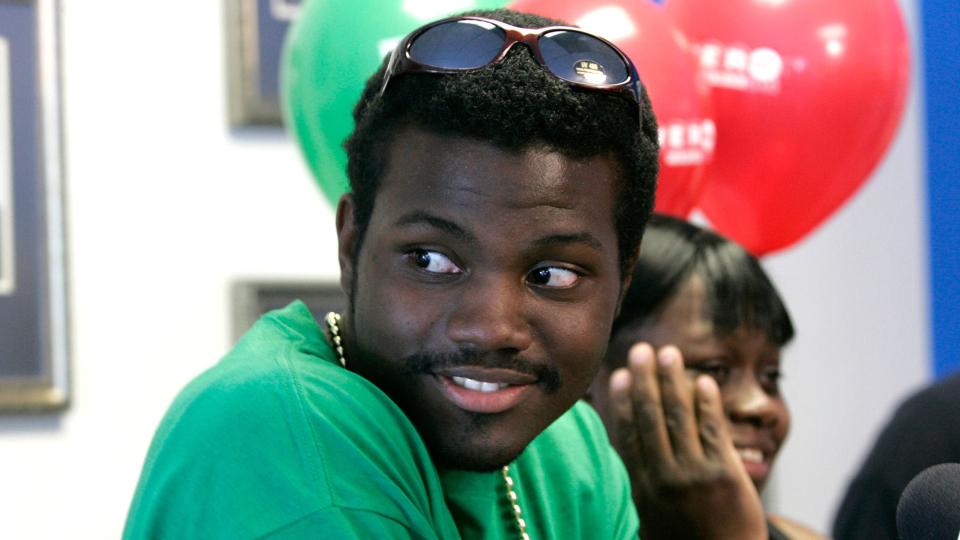Mega Millions Jackpot: The Do's and Don'ts of Winning the Lottery Based on Winners' Experiences

Drew Angerer/Getty Mega Millions lottery tickets
The odds of scoring Mega Millions' second-largest jackpot in history are low. The odds that tonight's winner might mishandle their winnings? Pretty high, based on the experiences of lottery winners past.
But if you are that one in 303 million, consider these cautionary fails and unlikely successes before embarking on a shopping spree.
Do: Follow Your Dreams
Whoever said you can't buy happiness must have had some inexpensive hobbies. For down-on-his-luck cowboy Neal Wanless, a $232.1 million Powerball win in 2009 allowed him to live comfortably while pursuing his passions. At 23 years old, Wanless bought a nearly 50,000-acre ranch in South Dakota. In 2020, he told the Wall Street Journal that he's stayed grounded thanks to the rewarding challenges of life on the range.

Erik Campos/The State/Tribune News Service via Getty Jonathan Vargas won big in 2008
Don't: Dream Recklessly
When 19-year-old Jonathan Vargas won a $35.3 million Powerball prize in 2008, he listened to his heart and invested in his dreams. In 2010, Vargas created Wrestlicious Takedown, an all-female wrestling TV show in which he appeared under the persona "JV Rich," according to IMDb. Wrestlicious ceased production following one season. Vargas withdrew from the public eye and, speaking to CBS News, expressed some regret for his spending endeavors. He's not the only lottery winner whose investments flew a bit too close to the sun, but his failure is the first to earn a spot on Bleacher Report's "25 Worst Wrestling Promotions Ever."
Do: Hire Guidance
You can't win money management skills in the lottery. Forbes suggests that finding a team of advisors is a key move in holding on to that jackpot.
In 2012, Louise White left her local Stop & Shop with rainbow sherbet and–purchased on a whim –– a lottery ticket that eventually won her the $336.4 million prize, according to CNN. Following the advice of her legal and financial advisors, ABC News reported that the lucky 81-year-old started the Rainbow Sherbert Trust (that's not a typo; that's how she says the store spelled "sherbet").
Speaking to ABC News, White's team explained that they intended to distance her from the money, avoid complications with it, and protect White's privacy.
Don't: Be Too Generous
Expect everyone you've ever met to reach out if your lotto ticket lucks out … with a price tag attached to each "congratulations." Billionaire Mark Cuban's advice? Generally, just say no. "Anyone who asks is not your friend," the Shark Tank investor told Business Insider in 2016.
Irish winner Peter Lavery (£10 million in 1996, around $USD12.8) proves that, indeed, the road to wealth is not paved with good intentions, according to the Irish Times. Over 20 years after his big win, still-rich Lavery said that he received thousands of letters asking for financial support. "Burn them, ignore them, don't open anything if you don't know who it's from," he said to the Belfast Telegraph in 2019.
Do: Give Wisely
The best way to give is to give back. Pledging money to charities puts you in control of the amount, your anonymity and – for the most part – where that donation will end up. However, lottery horror history simply cannot forget the ill-fated philanthropy efforts of Janite Lee ($18 million in 1993), who gave significant sums to major political causes, according to TIME. TIME also reported that Lee spent time with the likes of Bill Clinton and South Korean President Kim Daw-Jung and got used to a lifestyle that ended up with her out-of-control spending and in debt.

ERIC BARADAT/AFP/Getty Images
Do: Stay Anonymous…If Possible
Such a large sum of money is bound to grab public attention, and in some states, you are legally obligated to disclose your name. According to Vox, only eight states allow winners to conceal their identities.
Don't: Be Conspicuous
If you can't stay anonymous, then it's best to keep your lifestyle low-key. Lavish spending on cars, mansions and vacations will do more than just drain your bank account –– it also grabs attention.
Billie Bob Harrell Jr. won $20 million in 1997, two decades before his home state of Texas passed a bill permitting lottery anonymity. The 47-year-old was incessantly hounded for money; he changed his phone number several times during the 20 months that it took to lose his fortune, according to TIME.

